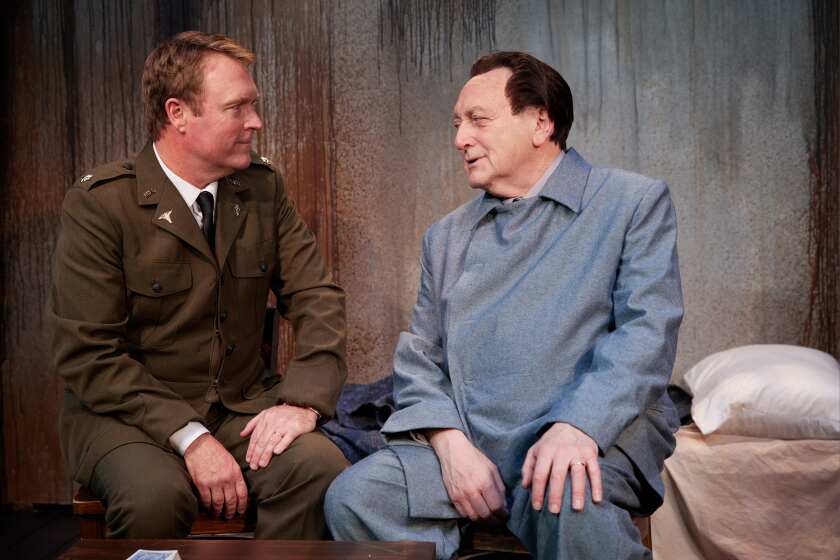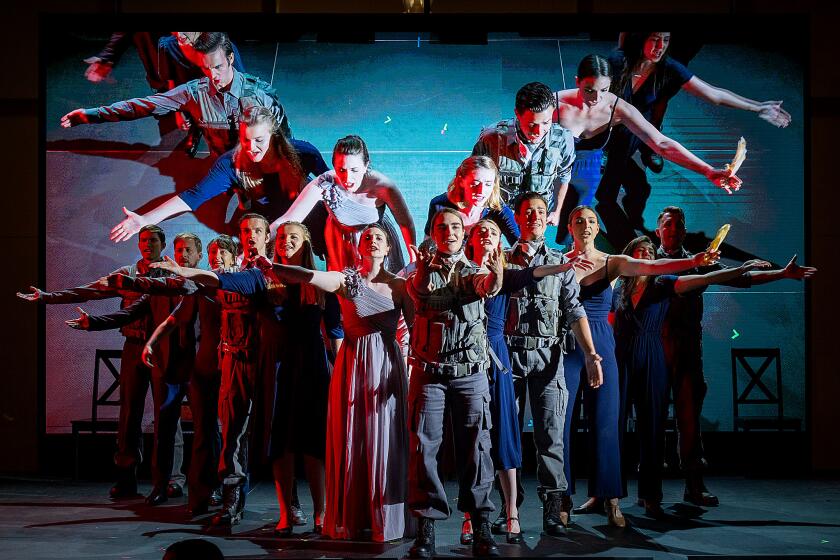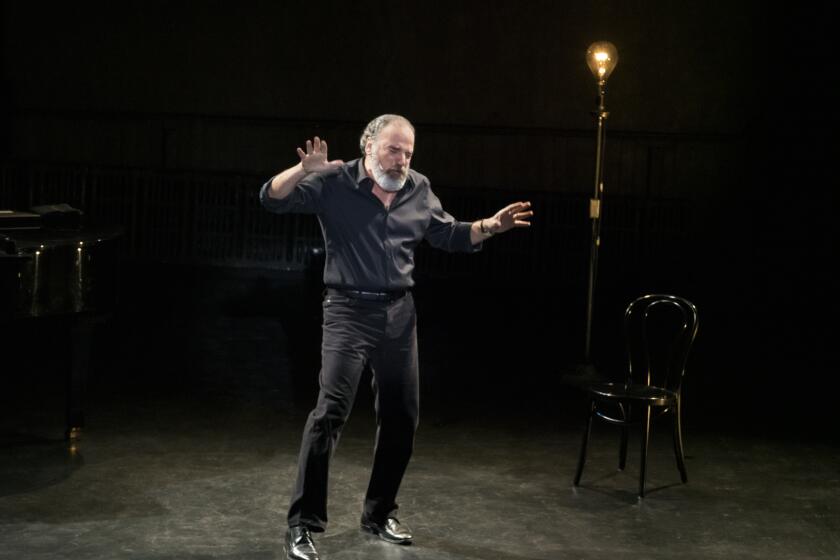‘Last Tiger’ a tale like no other
Jeff Augustin’s Haiti-set play a milestone for Playhouse/UCSD partnership
Before Jeff Augustin puts the first words of a play on the page, he sends a little song out into the universe.
“I usually start with this hum — this bluesy, jazzy hum — and then I start typing,” says Augustin, whose world-premiere work “The Last Tiger in Haiti” is now in rehearsals at La Jolla Playhouse.
“It’s always the same (melody). I don’t know why. But it’s as if I’m conjuring. It’s just this thing I like to do when I start something.”
“The Last Tiger in Haiti”
When: Previews begin Tuesday. Opens July 8. 7:30 p.m. Tuesdays-Wednesdays; 8 p.m. Thursdays-Fridays; 2 and 8 p.m. Saturdays; 2 and 7 p.m. Sundays. Through July 24.
Where: La Jolla Playhouse’s Mandell Weiss Forum, Playhouse/UC San Diego Theatre District, 2910 La Jolla Village Drive.
Tickets: About $20-$59 (discounts available)
Phone: (858) 550-1010
Online: lajollaplayhouse.org
With “Last Tiger,” Augustin happens to be starting something that has never occurred before — and it’s a milestone both for the Playhouse and UC San Diego’s graduate theater program.
The play, conceived when Augustin was an MFA student there, is the first by a graduate of the program to make the leap into a Playhouse subscription-season lineup. (It begins performances Tuesday.)
It’s an important moment in the long partnership between the university’s Department of Theatre and Dance and the Playhouse, which share space and resources.
The director of “Last Tiger,” Joshua Kahan Brody, is likewise a graduate of the MFA program, which has endured budget cuts (as have many departments at UCSD and the broader University of California system) even as it remains a sought-after destination for young theater artists.
“I’m super-grateful to the program, both for all the things we learned and all the community we found there,” says Brody, a 2013 graduate who is on a yearlong apprenticeship at the Playhouse as a Princess Grace Award winner. “It does feel like kind of a cool homecoming.”
The rising Augustin, who graduated in 2014 and has landed multiple awards and residencies in New York and around the country, says: “I don’t usually walk around in the office spaces (at other theaters). I’ll stay in my rehearsal room, or find some quiet corner outside to write.”
But being back in the Playhouse/UCSD Theatre District, he says, “feels very much like home.”
History and heritage
If San Diego was Augustin’s artistic home during his fruitful years in grad school, the island nation of Haiti is in many ways his spiritual home.
That’s where several of his plays have been set, and it’s the place of his family’s heritage, although Augustin was born and raised in Miami with his six siblings after his mother emigrated.
Haitian folklore and mystical traditions have figured prominently in his work: His play “Little Children Dream of God,” which had its first production as part of UCSD’s Wagner New Play Festival in 2013, built a dreamlike world upon the story of his mom’s journey to America.
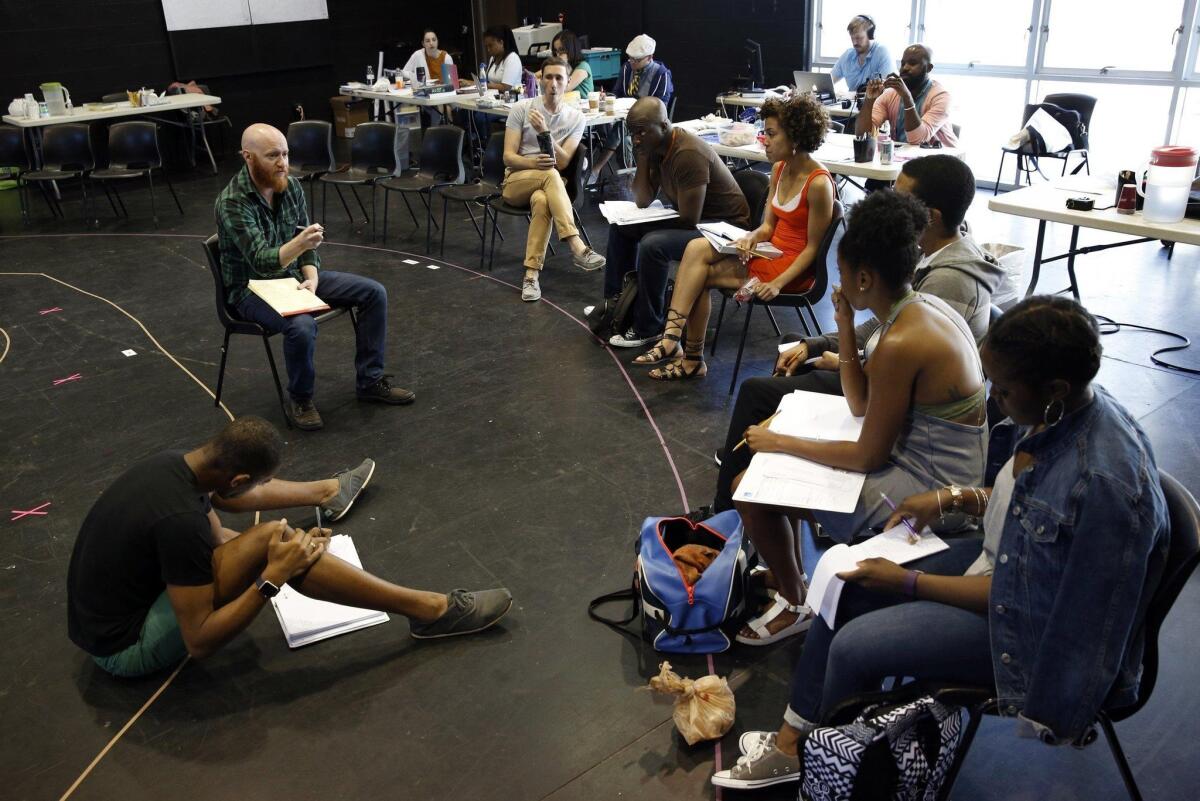
That play, the first collaboration between Augustin and Brody, was subsequently produced by the off-Broadway Roundabout Theatre in New York, and Augustin was named the first playwright in residence at the company’s Roundabout Underground.
“I think there’s always a sense of magical realism in my work,” says Augustin, who senses an echo between the theme of transformation in Haitian folklore and the way he has long regarded the art of storytelling.
“When I was a kid and was telling stories, it felt like the world just happened,” he says. “Like halfway through, it would feel that my stick transformed into a sword.
“So there’s magic in the way that kids tell a story and it becomes real to them.”
That idea is key to “The Last Tiger in Haiti,” which began as in idea for a class taught by Naomi Iizuka (longtime head of the MFA playwriting program at UCSD) and was further developed last year as a workshop project in the Playhouse’s DNA New Work Series.
The five-character play focuses on a group of restaveks — the term for Haitian children who essentially function as slaves (although there’s some disagreement over the use of that description).
The restaveks, who come from extremely poor families, are placed in more affluent households as a matter of survival, and are required to work for their host families until they’re 18.
It’s a situation that can leave the restaveks vulnerable to mistreatment and abuse. (A group called the Restavek Freedom Foundation says about one in 15 Haitian children are part of the system.)
In “Last Tiger,” a co-production with Berkeley Rep (which is staging the play in October), the young characters spend a night trading stories, with their tales gradually taking on elements of the surreal.
(The children are all played by adult actors: They include Brittany Bellizeare as Rose, Clinton Roane as Emmanuel, Andy Lucien as Max, Jasmine St. Clair as Laurie and Reggie D. White as Joseph.)
“There is a kind of magic in this play,” says Brody. “But the stories are most impactful when the whole time we remember that these kids have nothing. It’s still grounded in a super-real sense of the world.”
Augustin adds that “even though it is in part about this form of child slavery, there is joy and humor and love to it. And it’s also dealing with this idea of ownership over one’s narrative.”
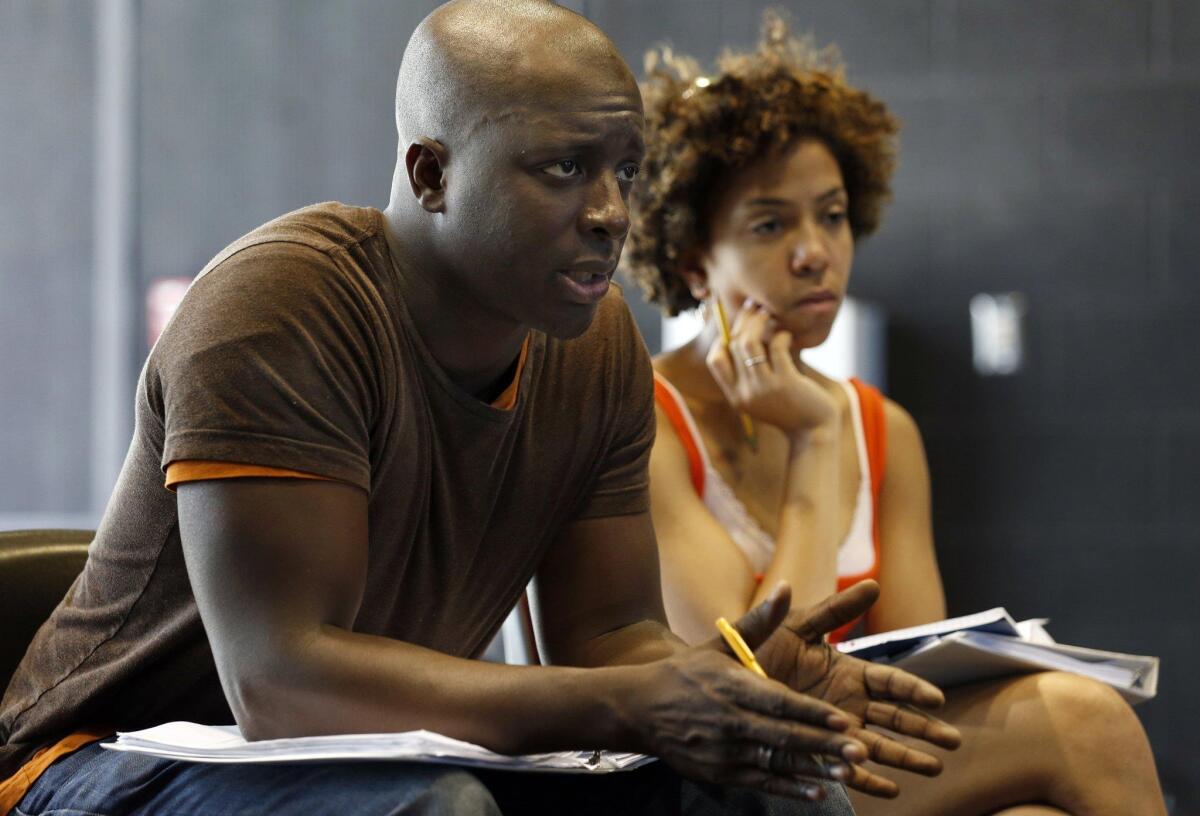
For the playwright, there’s a personal side to the importance of storytelling: “I felt as though I had to grow up very quickly for various reasons as a kid,” which stirred an interest in how children cope with trauma, Augustin says.
“When I was a kid, building a world and telling myself stories was a way to do it.”
His play originally was called “Krik? Krak. Or the Last Tiger in Haiti,” a title that gets at the central role of storytelling in the piece.
Those first words come from a Haitian tradition of sharing tales: “If I want to tell a story,” as Augustin explains it, “I say ‘Krik.’ And if you want to hear a story, you say ‘Krak.’
“What I love about it is you have to get the audience’s permission to tell the story.”
Brody (a co-founder of the San Diego-based troupe The Trip) says that idea dovetails perfectly with the kind of unspoken transactions that take place between audiences and theater artists.
“Krik-krak-ing is inherent to the way we watch theater,” he says. “Even if we don’t say ‘krik krak,’ I come in and put a poster in front of the theater that says I have a story to tell, and you give me $24 so you can come watch it,” he says with a laugh.
To Brody’s eye, “Last Tiger” is “Jeff’s most bleak play in some ways. In other ways, it’s a pretty extraordinary play about the way we somehow manage, in healthy and unhealthy ways, to love and fight to love.
“The way we love our abusers in a way, and the way we love those who have betrayed and hurt us.
“And then, vice versa, (how we’re) made real by love. Made whole.
“It’s something that’s really special in the play, and at this moment in history feels very true and important.”
Get U-T Arts & Culture on Thursdays
A San Diego insider’s look at what talented artists are bringing to the stage, screen, galleries and more.
You may occasionally receive promotional content from the San Diego Union-Tribune.



